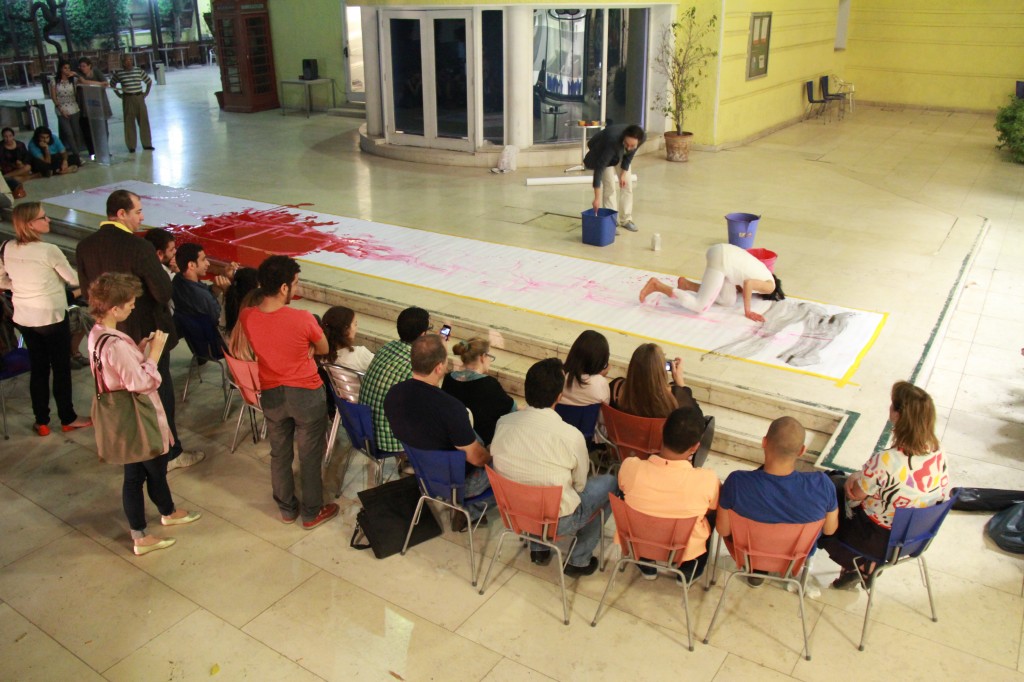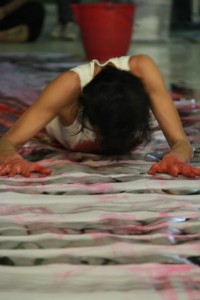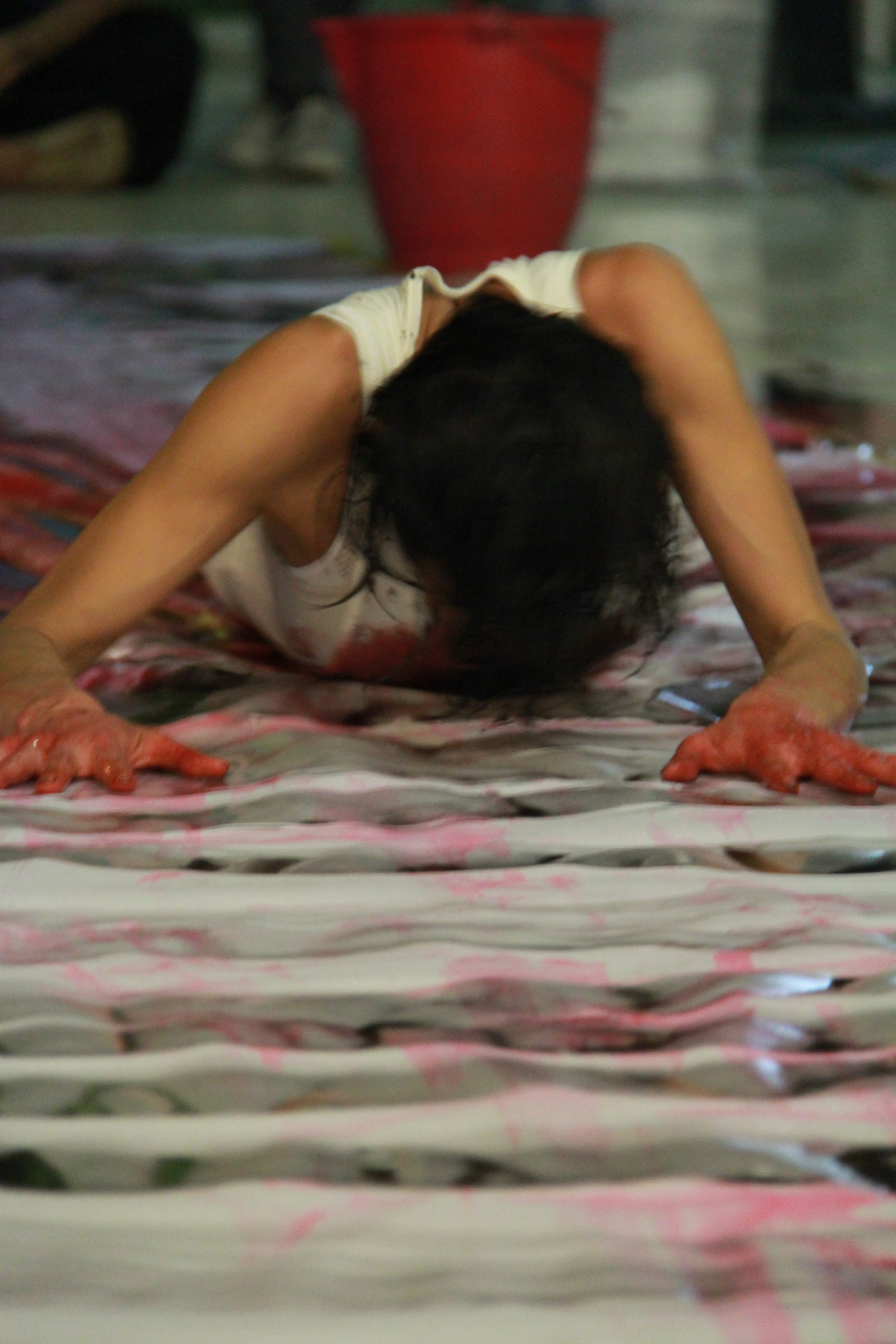 The TransDance Festival has scheduled several performances which have been exploring the boundaries of art and how contemporary performances experiment with the parameters to which they are expected to adhere. Last Friday night Deborah Stokes and Lilibeth Cuenca engaged an audience in the British Council in two separate performances which left some amused and others with their expectations challenged.
The TransDance Festival has scheduled several performances which have been exploring the boundaries of art and how contemporary performances experiment with the parameters to which they are expected to adhere. Last Friday night Deborah Stokes and Lilibeth Cuenca engaged an audience in the British Council in two separate performances which left some amused and others with their expectations challenged.
Cathy Costain, head of programmes for the arts at the British Council, explained why they are supporting the TransDance Festival with both a grant as well as space for performances. “After 25 January we started the Grants for Artists programme, where we focused on the needs of emerging artists. We did a lot of research and spoke with many young artists and found out that what they needed was a small grant to be able to make their creative ideas a reality.” Many of the grantees are young and the artists work in many different media. The grants have been used for a variety of projects, from composing lessons to the publication of books in Arabic. “When we select the applications for the grants we try to support the dreams of young artists and their enthusiasm and vision is what counts, we give no comment on the artistic value of the art.”
This year the programme has been incorporated into their normal grant system and artists have applied for grants as before. “We focus on artists that are outside of the mainstream, who work outside of Cairo and Alexandria and use different venues than the normal ones,” Costain said. “This has not always been easy, during a street performance that was not appreciated by the people living in the area we once had to hide with the rest of the audience inside somewhere.”
The British Council has worked with TransDance before and Costain said, “the performances thus far have been different from what we expected; there is not as much dance as we originally thought.” When asked if she felt this was a negative Costain smiled and said, “not at all, the more diverse the better!”
During a short introduction by Adham Hafez, the director of the festival, explaining how performance art had changed the classical forms of art and had opened the door for contemporary and modern art forms to develop, a figure dressed from head to toe in a white, close fitting suit covered completely in small mirrors sat down on the steps to listen. As the introduction continued, the shiny figure changed positions, from sitting formally upright to ending up comfortable lying down, showing the audience the full spectrum of how one can listen.
After this, Deborah Stokes from the United Kingdom walked briskly towards the audience, sporting a folded up umbrella on her arm and Union Jack Wellington boots. Reading from a small notebook she proceeded to entertain and confront the audience by asking them questions in between short statements. The quick, quirky questions told a story, the narrative smartly incorporated references to the UK, the premises and the exchanges that happen between Egyptians and residents of the UK.
Referring to the students of the British Council she said, “those taking classes here do this for economic motives, not because they love Shakespeare.” And, “some of the performers of the festival entered your country under the pretext of cultural exchange, but they fully intend to stay here and plan terrorist activities.” The fast interjections of serious questions as, “how many revolutions did you watch on television?” in between hilarity, like “do you think English men are attractive?” and “…if they offer you marriage it is because they want your passport, not because you are attractive,” made for poignant moments which kept the audience riveted.
As her phone rang inside the umbrella Stokes informed the spectators that the UK artists were not going to perform that night; the security services had stopped them since their visas did not permit work. She comforted us by saying, “if you are upset, please think about the fact that the performance may have been bad.”
Stokes lived in Cairo in the past and enjoys being back to perform. “I enjoyed the performance tonight, each time it is different, depending on the location and the audience,” she said. “I use references to where I perform, like tonight I included our location, the British Council, and the way people from the UK and Egypt interact.”
Stokes has contributed work to two other projects during TransDance, a film about Indian dance that will show as part of the movie festival and a sound installation that is part of the video and sound installation project. “The three pieces are all linked and I hope that the audience will see how they correlate as they experience each separate entry to the festival,” she said.
After a short break Lilibeth Cuenca reenacted famous performance art pieces which created an uproar in the 1960s and 1970s and had never been performed in the Arab world before.
A sheet of thick white paper, at least 20 metres long, was taped to the floor and Cuenca opened the performance by reciting a song about art, posing questions such as: what is art, who decides this and who decides on the meaning of art; the relationship between art and money, “artists get hungry too”; what art should accomplish, “art should move people’s minds”; and the dichotomy of experimental artists, “I want to take part in art history too, but you can only do what feels right for you.”

The audience was then invited to come closer as Cuena, dressed in pristine white, crawled along the paper while licking the centre of the ‘canvas’. Lying down flat and pushing herself back to the other side, Cuenca then donned shorts which had a paintbrush dangling in the middle and squatted over a large bucket to dip the brush in the red paint. Squatting down and moving across the paper, she created red swirls as she continued. Halfway down, the bucket of fell over and a surge of red paint flooded the middle section of the paper, but this did not stop Cuena of continuing the performance.
Making her way back across by dragging her body through the paint, Cuena became an integral part of the piece. The next section only reinforced this, when she dipped her head in a bucket of black paint and used her hair to paint broad sweeps across the paper from left to right. Continuing down, not stopped by the pool of red paint in the middle, the paper was covered with more and more colour, as did the performer. The piece ended by Cuena again disturbing what she had just achieved, as she dragged her full body back to the point of departure.
Not everyone in the audience understood what they had just experienced. One spectator, when asked if she knew what the performance meant, said, “this is exactly the point. The artists made you think, the piece made you question and wonder, this is exactly what it is supposed to do.”
Hafez explained why he felt it was important to include the performance in the festival. “The radical statements that were made with performance art in the 1960s and 1970s were crucial to the development of modern and contemporary art, including dance. Without these performance artists breaking the confines of traditional art forms, present day art would not be what it is today,” he said. “None of these pieces have ever been seen in Egypt, or anywhere in the Arab speaking world, we only know the outcome of the change they initiated. By asking Cuena to reenact some of the famous pieces the audience got to experience a live performed trip through history.”
Deborah Stokes and Lilibeth Cuena will perform again tonight at The British Council at 5pm.



